
|
|
In Memory's Eye Recollections of Canadian Parliamentarians House of Commons Speakers During the years I had the privilege of being an officer of the House, a total of ten totally terrified Members of the Commons were forcibly dragged, protesting their reluctance to accept the chalice offered them by their colleagues who made them occupy the Speaker's Chair. Of course I joke. At one time the position of Speaker in the British House of Commons was a perilous one, exposed to the wrath of an upset monarch displeased with the growing rights of citizens and consequent loss of royal power. A tradition grew up that the man -- -it was always a man -- -chosen by his colleagues to become Speaker, would show his reluctance to undertake such a hazardous job. That tradition found its way into the Canadian House of Commons, hence the pretence regularly played out on the floor of the Chamber upon a new Speaker taking office.
As it turned out, Michener was no cat's paw for the government. Having seen how his predecessor, the ill-starred Rene Beaudoin, lost control of the House during the troublesome Pipeline Debate in 1957, he was determined to restore the Speakership to its independence from government diktat. As a result he incurred Diefenbaker's ire. And that was a lasting ire. On leaving office there was no desire on Diefenbaker's part to offer him a reward for his service to the Commons, and it was not until Liberals returned to government in 1963 that Michener became Canada's High Commissioner to India, followed by his appointment as Governor General of Canada. A measure of the man was his lack of pretension. He might be Speaker of the House, but daily he walked through the West Block on his way to take French lessons. There was no thought of having the language teacher come to him in the Centre Block. It also gave him an opportunity to drop into the committee reporting service offices and have a chat with the affable Charlie Empringham, branch chief. The aura of awe later fostered to insulate the Speaker from such vulgar contact with staff of the Commons only came much later. Michener's interventions from the Chair were direct, and he had a command of English that made him easy to report. He was a life-long believer in the old adage, mens sano in corpore sano, and became a daily runner long before jogging became the nostrum of the health fettish obsessed of our present times. Canada and its House of Commons were well served by Roland Michener, a gentleman in his own right.
Lambert, a veteran of the Dieppe raid in 1942, during World War II, where Canada's fighting forces suffered huge losses due to inept planning by inept British planners, carried something of a military bearing into later civilian and political life. He was held as a prisoner of war for three years. His memoirs of that experience have been recorded for posterity and, when released on a future date for the benefit of the public, will prove interesting reading.
Macnaughton broke precedent in spectacular fashion when he became the first member of the Opposition in the Canadian Parliament to be chairman of the Public Accounts Committee in 1958. As a parliamentary reporter in Dáil Éireann where it was customary to have an opposition member chair that committee, here was another instance where I found Canadian practice to lag behind that of other national legislatures. Macnaughton performed his task as chairman well and satisfactorily, so satisfactorily that he entered the office of Speaker with the good wishes of all parties. When he left that office he had established himself as a Speaker who had carried out his duty fairly, quietly, and effectively.
Lamoureux had a temperament clearly suited to the job. As the years passed his standing grew in the Commons, not limited by his physical stature, he being of moderate height. And the office of Speaker rose in esteem and respect. From the standpoint, actually the seating point, of a member of the Hansard staff, he was a pleasure to report. His rulings were precise, well founded, and tempered with a human touch. And in them a pattern could be discerned. In his preambles he paid full tribute to the arguments presented in support of the case put forward by a Member, be that Member in Opposition or in Government, and thanked the Member for the care he had taken in researching precedents. Then came the ruling, and though it may have gone against the Member raising a point of order or question of privilege, that Member could take comfort in the fact that his case had been heard and fully considered. Lamoureux was a master of the art, so much so that longtime observers came to know well in advance of the actual ruling exactly how it would go. His years of experience as a backbencher may have been responsible for the respect that he paid to Members in those benches. And he was even-handed. Rulings in favour of Government members were founded on fact. Rulings in favour of Opposition members were solidly based on reason and precedent. He had a human touch. Dignity without show was his hallmark. He was accessible. When it came time for prominent members of the staff to retire he acknowledged their services, sometimes publicly when presiding over the House, sometimes privately. Of this I had personal knowledge. Warren Buskard, the Editor of Debates, retired in 1966 after serving as a Hansard reporter and officer of the House for 43 years. Not many had equalled his devotion to duty as he upheld the independence of Hansard, free from political pressure and official meddling behind scenes. In the course of time he came to be resented by newer and more ambitious officials. Came the actual day of his retirement and his Hansard colleagues waited for the customary acknowledgment from the Chair at the end of Question Period. None came. What had gone wrong? Deputed to find out, I arrived at the Speaker's Office, gained ready admission, and was told by Mr. Lamoureaux that he had no knowledge that Buskard was retiring that day. He had not been officially informed. It was a mean, vindicative act that was never forgotten. As Speaker, Lucien Lamoureux took an active interest in the well-being of staff, and acted as court of last resort whenever his assistance was sought. His entry in the Canadian Parliamentary Guide is one of the shorter ones in the list of Privy Councillors. His legacy as Speaker is a lengthy one, befitting the man and the Office. Curiously, where others with less distinguished records were granted some of the highest recognition possible, Lucien Lamoureux was accorded a minor ambassadorship on his retirement. Later he served the city of his birth in a number of volunteer capacities, most notably as Chairman of the Civic Hospital Foundation, raising funds for a most deserving cause. Years after he left public life he was asked to disclose the secret of his success as Speaker. With customary modesty he replied: "I had a strong Table". Table in this sense meant the Clerk and Assistant Clerks sitting at the table in front of the Speaker's Chair on the floor of the House, always available to advise on procedural matters. During Lamoureux's eight years and nine months as Speaker they included Leon-J Raymond, Gordon Dubroy, T. R. Montgomery, and Alex Small, ably assisted in other capacities by Dr. Maurice Ollivier, Law Clerk; Reg Boivin, Chief of French Journals, and Ed O'Connor, Chief of English Journals.
Dependent upon newly appointed officials, much of the advice he acted upon brought unnecessary burdens on his head, and his conduct was openly questioned in the pages of the Ottawa Citizen where he was likened to a riverboat gambler. Whether he deserved such harsh criticism is open to question. He suffered much anguish when a young son suffered severe injuries in a motor vehicle accident. Striving for consensus, and at times unable to achieve it, he drew both praise and criticism. He was beholden to none, being the first Member of the House to be elected its Speaker by a free vote of its members. Prior to that Speakers had been nominated by the Prime Minister of the day, and usually were unopposed. In that respect, Jerome broke new ground. Ever afterwards, all Speakers have been elected by the members at large. On his retirement from office he was appointed Associate Chief Justice of the Federal Court of Canada.
Lofty, removed, and determined to have her way, she attempted to rule in somewhat autocratic fashion. She was in charge, and she wanted everyone to know it. The House of Commons was not accustomed to such treatment. As its name implied, it was the house of the common people, and common people see through pretension. Somewhere along the way, Saskatchewan born Jeanne Sauvé lost the common touch. Her office chambers were redone to reflect her tastes, the chair she sat on while presiding over proceedings in the Chamber had to be fitted with a lifting and lowering electronic device to suit her leg length, and in short order she despatched experienced senior procedural staff to more menial tasks. That last move proved costly in the long run. No one was left to say "No", and that was how she preferred things to be. When the crunch came and the House shuddered to a halt, the Opposition refusing to attend over disagreement with the government's attempt to push through a massive omnibus bill, a step which she had sanctioned, no one could come forward with a timely solution. Technically the House remained in session as the division bells rang for seventeen days and nights summoning Members to take their seats. And for each of those days and nights the Chamber was staffed. Constables remained on duty at the doors and in the galleries, clerks sat at their table, and Hansard staff attended in eight-hour rotations throughout. The affair made a mockery of Parliament, an affair that the Speaker seemed unable or unwilling to resolve. "The House got itself into this mess. The House should find its own way out of it." Such was her understanding of what was taking place. Having weakened the Table, she suffered the consequences. Not to belabour matters, at the end of her Speakership she was rewarded by appointment as Governor General of Canada on December 23, 1988. A description of her rule at Rideau Hall lies in the National Archives of Canada, where it awaits release at a pre-determined date. If Lucien Lamoureaux's Speakership was the best in the later years of the 20th century, Jeanne Sauvé's was arguably the worst. Her abdication of responsibility during the seventeen days that the Opposition withdrew from the Chamber in 1983 was a disaster that brought the House of Commons into general disrepute among the public, disrepute from which it is still struggling to escape, although some advances have taken place.
Francis had a gruelling introduction to the duties of the Chair when he first acted as Deputy Speaker in 1984 when Speaker Sauvé held sway. It fell his lot to preside over the tempestuous debate that rocked the Chamber when the issue of amending the Constitution was under debate. The spectacle of one member leaving his seat and advancing on the Chair has been captured in televised recordings of the proceedings. There were angry shouts, gesticulations, general upheaval and breaches of parliamentary decorum when it came time for him to rise and "put the question" to the House, otherwise known as calling for a vote. It had been customary for the Speaker to preside on such important occasions in the past, but Madame Sauvé left it to Lloyd Francis to bear the brunt of Members' anger. Those who were present will not forget the courage Francis displayed on that occasion. It would have been so easy to adjourn the House on the grounds of unruly behaviour and hope that the more passionate Members might be persuaded in the ensuing interval to remember the dignity of Parliament, and restrain themselves. Francis held firm. Faced with fists raised, prolonged jeering and shouted insults, he stood alone on the Speaker's dais, and by sheer dint of personal determination succeeded in confirming the Speaker's right to be heard and to put the question. For that alone he deserved to sit on the Speaker's Chair in his own right when he was later elected Speaker by his colleagues in all parties. He took a personal interest in the welfare of Hansard as a functioning arm of Parliament, and in the treatment of its personnel. Many remember his consideration for the staff during all-night sittings, when trays of sandwiches were delivered to them at intervals, courtesy of Mr. Francis. Like Speaker Lamoreaux, he was awarded a minor ambassadorship following his term in office. As one who had served his native city Ottawa, and its foremost institution, the House of Commons, well and with distinction, many felt he deserved greater recognition from the government of the day.
A pleasant man, low-keyed in tone and voice, he was diligent, hard-working, eager to learn, and had the ability to carry with him throughout his term as Speaker the respect and good wishes of members in all parties. When he left office a special position was created for him, Canadian minister at large for the Environment, for which his earlier experience had well qualified him. Hansard staff found him easy to report, and he took a keen interest in the progress made in introducing electronic reporting which could provide closed captioning of the televised proceedings of the House. Unfortunately it was claimed there was no French method easily adaptable to the same task, and it fell his lot to acquiesce in the disbandment of the English Hansard staff and its amalgamation with its French counterpart, cutting off employment opportunities for English reporters who, at the time, were recruited from all the English-speaking provinces. Now debates are recorded, as distinct from reported, on tape. This brings this portion of memoirs centred on Speakers of the Canadian House of Commons to a close. The nine Speakers mentioned were those who spanned the years I spent observing and reporting them in the Parliament of Canada. All executed their duty as they saw fit, with results and consequences, good and bad, for the House of Commons, its traditions, powers, and failings. They contended with over-flowing egos, and with an official structure to which at times they yielded, barely retaining their own independence of thought and action. It was a maxim that new Speakers had two weeks in which to show their mettle before floundering under a tidal wave of officialdom. Some kept their footing. Some made their mark. Some became part of the scheme of things. It is little wonder that individuals elected to the position still make a show of reluctance to take the Chair, knowing the rewards but wary of the pitfalls. A good Speaker, a strong Speaker, is a pearl without price in a parliamentary setting. Others are mere paste.
Home | About | Canadian Vindicator | Literature | Gallery | History
|
||||||||||||||||||||||||||||||||||||||||||||||||||||||||||||||||||||||||||||||||||||
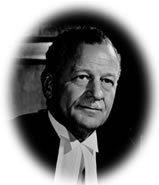 The serving Speaker when I became a member of the Hansard staff was the Honourable Roland Michener, an impressive figure in his Speaker's robes. That was during Diefenbaker's administration, a time when the Prime Minister had power to appoint whom he wished to the post.
The serving Speaker when I became a member of the Hansard staff was the Honourable Roland Michener, an impressive figure in his Speaker's robes. That was during Diefenbaker's administration, a time when the Prime Minister had power to appoint whom he wished to the post.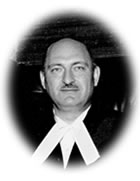 Following Michener as occupant of the Speaker's chair came the Honourable Marcel-Joseph-Aimé Lambert, who held the post for eight and a half months from September 27 1962 to May 16, 1963, the period during which the cabinet of John G. Diefenbaker self destructed. It was, to put it mildly, a time of political uproar.
Following Michener as occupant of the Speaker's chair came the Honourable Marcel-Joseph-Aimé Lambert, who held the post for eight and a half months from September 27 1962 to May 16, 1963, the period during which the cabinet of John G. Diefenbaker self destructed. It was, to put it mildly, a time of political uproar.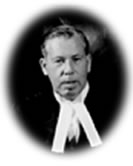 A more settled atmosphere in the Commons was experienced by Marcel Lambert's successor, the Honourable Alan B. Macnaughton, during the two and a half years from May 16 1963 to January 1 1965.
A more settled atmosphere in the Commons was experienced by Marcel Lambert's successor, the Honourable Alan B. Macnaughton, during the two and a half years from May 16 1963 to January 1 1965. 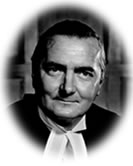 The Honourable Lucien Lamoureux is the man who set the standard for all who succeeded him as Speaker right through to the present day, and possibly for many more Parliaments to come. Born in Ottawa, he qualified as a barrister and entered Parliament as a neophyte backbencher following the General Election of 1962. He held the post of Deputy Speaker for more than two years when Macnaughton was Speaker, and went on to be selected Speaker on January 18, 1966. He held that post for the next eight years and nine months.
The Honourable Lucien Lamoureux is the man who set the standard for all who succeeded him as Speaker right through to the present day, and possibly for many more Parliaments to come. Born in Ottawa, he qualified as a barrister and entered Parliament as a neophyte backbencher following the General Election of 1962. He held the post of Deputy Speaker for more than two years when Macnaughton was Speaker, and went on to be selected Speaker on January 18, 1966. He held that post for the next eight years and nine months.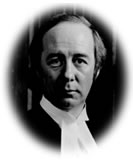 The Honourable James A. Jerome, the Member for Sudbury, occupied the position of Speaker from September 30, 1974 until December 14, 1979. He held the reins of office loosely. It wasn't that he lacked a firm hand. On occasion his peremptory rulings prevented outbreaks of trouble from developing further, but he had the misfortune to create a degree of animosity on the part of Opposition members.
The Honourable James A. Jerome, the Member for Sudbury, occupied the position of Speaker from September 30, 1974 until December 14, 1979. He held the reins of office loosely. It wasn't that he lacked a firm hand. On occasion his peremptory rulings prevented outbreaks of trouble from developing further, but he had the misfortune to create a degree of animosity on the part of Opposition members.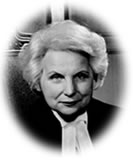 The
Honourable Jeanne Sauvé was born April 26, 1922, in Prud'homme, Saskatchewan, daughter of French-Canadian parents. Her husband Maurice, a native of Québec, was a minister in the cabinets of Lester B. Pearson, where he held the posts of Forestry and the expanded Forestry and Rural Development departments, before going down to defeat in the General Election of 1968. He was a capable minister, somewhat overshadowed by his more forceful spouse who became a Member of Parliament four years later in 1972. Her rise to prominence was rapid, first Minister of State for Science and Technology, then Minister of the Environment, and lastly Minister of Communications. In 1980 she was elected first woman Speaker of the House of Commons.
The
Honourable Jeanne Sauvé was born April 26, 1922, in Prud'homme, Saskatchewan, daughter of French-Canadian parents. Her husband Maurice, a native of Québec, was a minister in the cabinets of Lester B. Pearson, where he held the posts of Forestry and the expanded Forestry and Rural Development departments, before going down to defeat in the General Election of 1968. He was a capable minister, somewhat overshadowed by his more forceful spouse who became a Member of Parliament four years later in 1972. Her rise to prominence was rapid, first Minister of State for Science and Technology, then Minister of the Environment, and lastly Minister of Communications. In 1980 she was elected first woman Speaker of the House of Commons.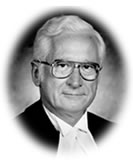 The Honourable Lloyd Francis, who became Speaker for ten months in 1984, was a native of Ottawa, Canada's capital. By profession an economist, he established a somewhat peculiar record among Canadian politicians. First elected to the Commons in 1963, he was defeated in the General Election of 1965, re-elected in 1968, defeated in 1970 and 1972, and re-elected once more in 1980. His was truly a bellweather constituency, reflecting the prevailing political winds of the times.
The Honourable Lloyd Francis, who became Speaker for ten months in 1984, was a native of Ottawa, Canada's capital. By profession an economist, he established a somewhat peculiar record among Canadian politicians. First elected to the Commons in 1963, he was defeated in the General Election of 1965, re-elected in 1968, defeated in 1970 and 1972, and re-elected once more in 1980. His was truly a bellweather constituency, reflecting the prevailing political winds of the times.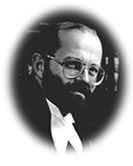 The Honourable John William Bosley was "new age" Speaker. Born in 1947, he was only thirty-four when he was elected Speaker in 1984. He had experienced the social revolution that changed life in Canada and other countries through the 1960s on into the early 1970s, and he sought to bring something of that era into the stodgy atmosphere of a House of Commons so protective of its mores and customs. He resigned from the Speakership in 1986, having held the position for two years less a month.
The Honourable John William Bosley was "new age" Speaker. Born in 1947, he was only thirty-four when he was elected Speaker in 1984. He had experienced the social revolution that changed life in Canada and other countries through the 1960s on into the early 1970s, and he sought to bring something of that era into the stodgy atmosphere of a House of Commons so protective of its mores and customs. He resigned from the Speakership in 1986, having held the position for two years less a month.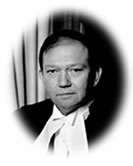 Next to be elected Speaker was the Honourable John Allen Fraser, who took over that position on October 1 1986, and who was the Member for Vancouver South. He had previously held a number of ministerial portfolios, one being Minister for the Environment.
Next to be elected Speaker was the Honourable John Allen Fraser, who took over that position on October 1 1986, and who was the Member for Vancouver South. He had previously held a number of ministerial portfolios, one being Minister for the Environment.